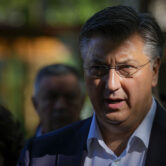MOSCOW (AP) — An investigation has found that a failed Russian rocket launch three weeks ago that aborted after just two minutes was caused by a sensor that was damaged during assembly, a top Russian official said on Thursday.
The Soyuz-FG rocket carrying NASA astronaut Nick Hague and Roscosmos' Alexei Ovchinin failed shortly into the Oct. 11 flight, sending their emergency capsule into a sharp fall back to Earth. The two men landed on a steppe in Kazakhstan safely in the accident, the first of its kind for Russia's manned program in over three decades.
The head of the Russian space agency earlier blamed the failure on a malfunction of a sensor, but didn't explain why it didn't work.
Oleg Skorobogatov, who led the probe into the accident, told reporters on Thursday that the investigation found that the sensor was damaged during the final assembly at the launch pad in Kazakhstan.
Russian rockets are manufactured in Russia and then transported by rail to the Russia-leased Baikonur cosmodrome.
The last time Russia saw an aborted manned launch was in 1983, when two Soviet cosmonauts jettisoned and landed safely after a launch pad explosion. More recently, Russia's space program has been dogged by a string of failed satellite launches involving unmanned vehicles.
Skorobogatov said officials are now taking steps, including putting all assembly staff through competence tests and additional training, to make sure such incidents will not happen again
The rocket producer will also take apart two other rockets which have been recently assembled and are due to launch in the coming weeks and then re-assemble them, Skorogobatov said.
Russian space officials plan to conduct two other unmanned Soyuz launches before launching a crew to the space station. The current space station crew — NASA's Serena Aunon-Chancellor, Russian Sergei Prokopyev and German Alexander Gerst — was scheduled to return to Earth in December after a six-month mission but will have to stay there for at least an extra week or two to ensure a smooth carry-over before the new crew arrives in early December.
The Russian Soyuz spacecraft is currently the only vehicle for ferrying crews to the International Space Station after the U.S. space shuttle fleet retired. Russia stands to lose that monopoly with the arrival of SpaceX's Dragon and Boeing's Starliner crew capsules.
Subscribe to Closing Arguments
Sign up for new weekly newsletter Closing Arguments to get the latest about ongoing trials, major litigation and hot cases and rulings in courthouses around the U.S. and the world.








